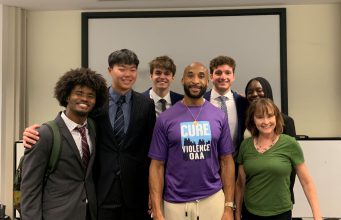Terms like “diversity and inclusion,” “equity,” and “sustainability” seem to be repeated everywhere lately. They appear in mission statements, press releases, and HR memos in attempts to recognize and mitigate long-standing injustices in the workplace and the world’s economy. But there’s a difference between knowing the right words to use and taking action to make them a reality.
The Roberto C. Goizueta Business & Society Institute’s Grounds for Empowerment (GFE) program seeks to balance the scales in one historically imbalanced industry: coffee. “From a business school perspective, coffee represents a very important problem,” said Giselle Barrera 15MBA, GFE’s program manager for Latin America. “It’s a multibillion-dollar market where you’re not looking for consumers. You don’t find coffee; coffee finds you. And yet, if you look at the value chain, the revenue is not distributed equally.”
According to Fairtrade International, coffee farmers make less than a dollar per pound for their products. Meanwhile, a pound of Starbucks’ Pike Place Roast sells for $12. Many factors contribute to the markup between bean and bag, but coffee represents a particularly imbalanced market. According to industry expert Peter Roberts, professor of Organization & Management and academic director of specialty coffee programs at the Institute, “Way too many people get not nearly enough. And it has nothing to do with what they’re bringing to the table; it has everything to do with how the table’s been set. As a program, GFE is unabashedly pro-market. We just want a market that’s better structured.”
“Way too many people get not nearly enough, and it has nothing to do with what they’re bringing to the table; it has everything to do with how the table’s been set. As a program, GFE is unabashedly pro-market. We just want a market that’s better structured.”
Peter Roberts, professor of Organization & Management and academic director of specialty coffee programs at the Roberto C. Goizueta Business & Society Institute
Empowering Women to Build a Better Coffee Market
Grounds for Empowerment connects women specialty coffee growers in Latin America with trained business school students and experienced industry mentors. This year, because the program was entirely remote, students participated not only from Goizueta, but from universities in Costa Rica, El Salvador, and Guatemala.
Through a series of classes and workshops, the program uses the Specialty Coffee Transaction Guide to empower women, some of whom are third- and fourth-generation coffee farmers, with information about real prices to analyze their coffee’s worth in the market. When the time comes to sell these coffees, “No one’s telling them what to expect; no one’s telling them what they deserve,” said Roberts. “Producers can come to the table fully owning their side of the transaction.”
“Owning their side of the transaction” does not merely mean fluency in Excel. According to Roberts, “Excellent coffee and amazing stories are the only two things sold in coffee shops.” So, after spending the first few weeks of the semester learning about the coffee production process, the global value chain, and the industry’s challenges and opportunities, students begin working with farmers as they learn to tell their stories.
Breanna Spurley 22MBA explained that in this phase of the program, her role with Dina—the first woman in four generations of coffee growers to manage the farm—was to reflect the uniqueness of Dina’s own narrative back to her. “There was so much emotion behind her story, but she thought all the things that she’d done to grow and maintain the family business were commonplace,” said Spurley. “They are not.”
After getting to know the farmers’ stories, participants shifted their focus to marketing and photography. “The photography piece was interesting, because I’d never thought about how important it was until I participated in Grounds for Empowerment,” explained Spurley. “One moment really stuck with me. Dina sent us some pictures, and one was just these big white flowers, blooming on the farm. I asked her, ‘Why did you pick this picture? What does it have to do with coffee?’ She said, ‘I’m the first woman in my family to manage this land, and I think it’s important that I add touches of femininity.’ And I thought, ‘OK, Breanna, time to listen.’”
“Listen and Collaborate” for True Transformation
The ability to listen and collaborate, rather than lecture, is vital to the program’s success. “When we first started working in coffee, we got almost everything wrong,” admitted Roberts. “There’s a strong temptation to come to the table as, ‘We are Emory University. You have problems; we have solutions.’ But our early efforts floundered because we approached things that way.”
Now, Grounds for Empowerment sees itself as “an exchange of learning,” as Barrera put it. “As someone who’s lived most of her life in Latin America, I know that the ‘development’ approach, where someone says, ‘read this pamphlet and you’ll understand and fix it,’ doesn’t work. Instead, we try to come up with collective solutions.”
This collaborative perspective yields transformative effects—not just economically, but relationally. “We build the program off of the Specialty Coffee Transaction Guide which has valid and current pricing information, but one of the biggest things we do is to just introduce these women to one another,” said Roberts. “So, there’s a novel idea of how much your coffee is actually worth, combined with new networks to support their farm businesses. It’s a chance for people to see themselves and their business in a different economic light, and it very much dwarfs the importance of, ‘I have these specific business skills that I need to teach you.’”
“It speaks to the size of the problem, that we are assembling ourselves around a network of organizations and stakeholders and farmers and supporters, but also consumers who love the industry and want it to be more transparent and sustainable long-term. It’s not something that one program or one organization is going to be able to fix.”
Giselle Barrera 15MBA, GFE’s program manager for Latin America
Changing the Narrative, Cup by Cup
Changing the coffee industry requires changing the narrative around the value of coffee itself. “It speaks to the size of the problem, that we are assembling ourselves around a network of organizations and stakeholders and farmers and supporters, but also consumers who love the industry and want it to be more transparent and sustainable long-term,” said Barrera. “It’s not something that one program or one organization is going to be able to fix.”
But acknowledging the scope of the problem does not mean surrendering to its complexity. “Do I think some professor is going to come up with a PDF file with a bunch of prices in it and a workshop curriculum, and this is going to fix the entire coffee industry?” said Roberts. “Not even close. Now, do I think that this is the best thing that we can be doing right now to create the preconditions where the future could look better than the past? Absolutely.”
Grounds for Empowerment is one of the many social enterprise initiatives of The Roberto C. Goizueta Business & Society Institute. The new Institute is charged with addressing some of the biggest global issues facing business and society today.











